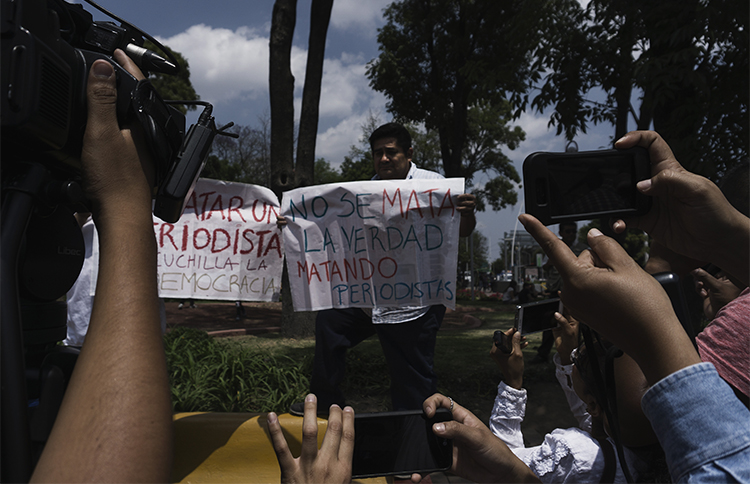Mexico City, June 1, 2017–Authorities in the Mexican state of Quintana Roo must undertake a swift investigation into the attack on journalist Carlos Barrios, the Committee to Protect Journalists said today. An unidentified man threatened Barrios, who reports for the news website Aspectos, and cut off part of his ear with a knife, his editor Eduardo Rascón told CPJ.
The attack on Barrios took place as he left the editorial offices in Playa del Carmen, between 1 a.m and 2 a.m. on May 29, Rascón told CPJ. According to Rascón and news reports, the attacker warned Barrios that Aspectos should stop publishing articles in support of Quintana Roo Governor Carlos Joaquín or “Eduardo Rascón will be next.”
Mexico is the most deadly country for the press in 2017.
“While the killings of reporters in Mexico have dominated headlines, for every murder there are numerous physical attacks and death threats that contribute to Mexico being one of the most dangerous places for journalists to work,” Carlos Lauría, CPJ’s senior program coordinator for the Americas, said from New York. “We call on the Mexican authorities to act quickly to ensure that those responsible for this attack on Carlos Barrios are brought to justice.”
Barrios covers local politics, tourism, and entertainment for Aspectos, and has worked for the outlet for about one year, Rascón told CPJ. He said that Barrios does not report on crime and violence. CPJ was unable to reach Barrios, whom Rascón said has taken a temporary leave of absence. The 27-year-old journalist received medical attention and is recovering from the attack, Rascón said.
The editor told CPJ that Aspectos, which started in 2014, mostly publishes articles in support of Joaquín, who assumed office as governor of Quintana Roo in September last year. “This attack is very strange and comes as a complete surprise to us. We haven’t received any threats and we don’t cover particularly controversial subjects,” Rascón said.
He told CPJ that Aspectos was critical last year of Joaquín’s competitor for governor, Mauricio Góngora, who between 2013 and 2016 was mayor of the municipality of Solidaridad, to which Playa del Carmen belongs. Rascón said that he received several anonymous threats warning him to stop critical coverage of the mayor during last year’s gubernatorial campaign and Góngora’s term as municipal president. CPJ attempted to reach Góngora for comment, but both the phone number and email addresses listed for him are no longer in service.
Rascón told CPJ that he will report the attack against Barrios to police this week; he said he first wanted to assess the situation with his lawyers and the victim. Several telephone calls by CPJ to the municipal authorities of Solidaridad, to which Playa del Carmen belongs, and the Quintana Roo state authorities, went unanswered.
This year in Mexico, at least four journalists have been murdered in direct relation to their work, according to CPJ research. CPJ is investigating the motive behind the murder of a fifth journalist and the disappearance of a sixth. On May 15, acclaimed investigative journalist Javier Valdez Cárdenas was shot dead in Culiacán, in the northern Mexican state of Sinaloa.
[EDITOR’S NOTE: The fifth paragraph of this alert has been updated to attribute the comments to Rascón.]
